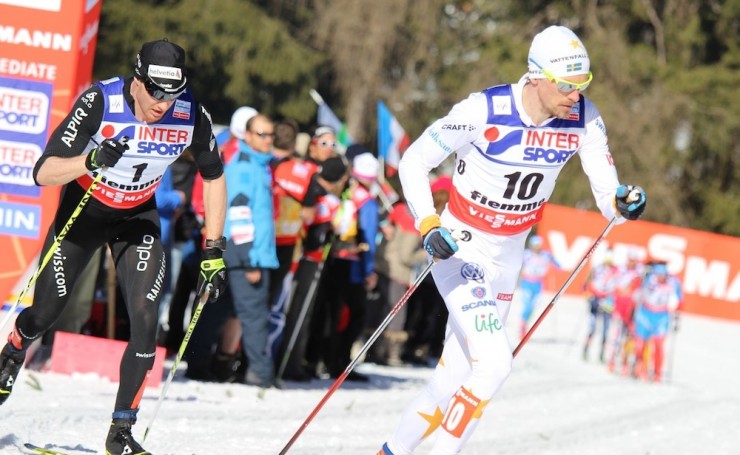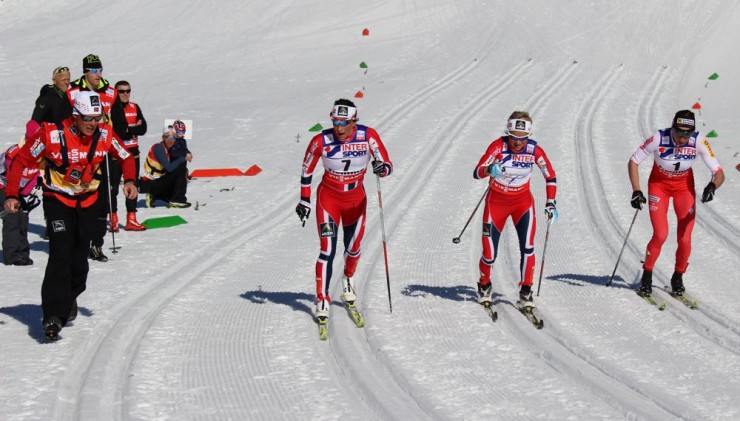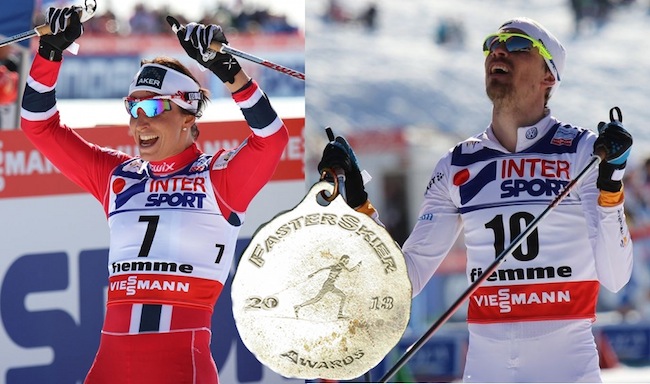When it came to picking this past season’s International Performance of the Year, Johan Olsson was a no brainer. We’ve still got his theme song stuck in our heads (“Johan Olsson, Johan Olsson, olé, olé, olé!”), which proud Swedish supporters sang as they wove through the stadium in Val di Fiemme, Italy, hoisting huge flags bearing Olsson’s name and face.
One of their own, 32-year-old Olsson, had finally secured gold in the 50-kilometer classic mass start on the last day of World Championships after Sweden tallied six silvers in Val di Fiemme. And he did so in temperatures near 55 degrees Fahrenheit after breaking away around 11 k. He led for much of the race after that, then dropped his only contender, Switzerland’s Dario Cologna, with about 30 k remaining.

Cologna worked within a chase group mostly led by Russia’s Alexander Legkov, but to no avail. Olsson was long gone, only letting Swedish teammate Daniel Richardsson to come within 12 seconds of him. Richardsson didn’t change skis before the last lap and made up time initially, but it cost him in the end.
Meanwhile, Olsson said he kept his head down and mind blank, focusing on himself. He cruised toward the finish uncontested, beating Cologna by nearly 13 seconds.
“I think the 50 k is the finest thing you can win in the World Championships,” Olsson said at the time, after having already notched two silvers in Val di Fiemme in the relay and 15 k freestyle. For the 2010 Olympic relay champ, it was his first World Championships gold.
“I think still my performance today means more than the gold medal, what I did out there, that I could go solo and just finish first,” he added.
It certainly wasn’t the first time he had broken away in a distance race and held his own in impressive fashion (see Johnny Klister’s recap of his 30 k Olympic bronze-medal performance), but his timing was impeccable.
“I think it almost is the greatest 50-kilometer achievement what we’ve seen today,” Norwegian team director Vidar Løfshus told NRK, according to a translation. “When you go [30 k] in front of this slush, as it says something about that man there.”
Women’s International Performance of the Year:

That would be Marit Bjørgen in the 30 k classic mass start at World Championships. The Norwegian nordic queen captured her 12th World Championships gold and fourth of the week in the final women’s race in Val di Fiemme, outsprinting Polish rival Justyna Kowalczyk to do so.
With about a 45-second lead on the chase pack, Bjørgen, Kowalczyk and Norway’s Therese Johaug skied relatively conservatively on the last of six laps. Everyone was waiting, and few knew when either of the three would make a move. Bjørgen and Johaug stuck behind Kowalczyk, who upped the pace with two climbs remaining, but the attack was unsuccessful and Bjørgen skied alongside Kowalczyk on the downhill.
There, with less than a kilometer remaining, the Norwegian attacked. Johaug slipped behind while struggling with her kick, while the Bjørgen and Kowalczyk battled for first. Bjørgen drafted Kowalczyk into the stadium and accelerated past her, winning by 3.7 seconds. Johaug finished third, 5 seconds behind Kowalczyk.
Bjørgen collapsed at the finish, soaking up the victory she had trained all season for after a heart arrhythmia derailed her Tour de Ski plans and chances of claiming the overall World Cup. Johaug immediately rushed to her side, crouching over Bjørgen to congratulate her.
“I think the other girls on the team knew that this was one of my biggest goals this season,” Bjørgen said at a post-race press conference. The last time Bjørgen won gold in the 30 k was at the 2005 World Championships in Oberstdorf, Germany.
“They were really happy for me and we are really happy for the whole team that we have been so good in this World Championships,” she added.
Norway won a total of 16 medals in Val di Fiemme, with four of golds coming from Bjørgen and Johaug posting another win in the 15 k freestyle.
Honorable mentions:
- Petter Northug | World Championships 15 k freestyle individual start
And we thought Northug needed external motivation. The 27-year-old Norwegian proved otherwise at the 2013 World Championships in Val di Fiemme, Italy, claiming his first gold of the week and eighth world title in a staggered start, no less.
He won the 15 k freestyle in 34:37, nearly 12 seconds faster than silver medalist Johan Olsson and 22.3 seconds ahead of Norwegian teammate Tord Asle Gjerdalen in third.
“Today is a day you dream of when you’re an athlete,” Northug said afterward. “You wake up, you feel that you have a lot of power, you want to compete, you want to give your all and also when you then win, it’s amazing.”
- Alexander Legkov | Tour de Ski
This guy successfully dethroned three-time Tour de Ski winner Dario Cologna of Switzerland (who won in 2009, 2011 and 2012), and became the first Russian to win the multi-stage race.
At 29, Legkov has topped the podium plenty of times on the World Cup, but never before in the Tour, in which he placed second in its inaugural year in 2007. Legkov outlasted Cologna, Norwegian Petter Northug and Russia’s Maxim Vylegzhanin, all of which started within 16 seconds of one another, to win the final climb up Alpe Cermis in Val di Fiemme, Italy. he beat Cologna by 19 seconds, and Legkov V2ed over the top.
“This is a great day for me,” Legkov told reporters. “It’s the biggest win of my career.”
- Therese Johaug | Holmenkollen World Cup 30 k
While one of her toughest competitors, Norwegian teammate Marit Bjørgen, wasn’t present for the 30 k freestyle mass start in Holmenkollen, Norway, Johaug put out a performance that would’ve been tough for anyone to beat on even their best day.
The 24-year-old trounced the field in the famous World Cup distance race, repeating her win at Holmenkollen in 2010 and winning the 2012 edition by nearly 47 seconds over Justyna Kowalczyk of Poland. Taking a page out of Johan Olsson’s book (see male performance of the year), she left the pack at 7 k and skied the remaining 23 k on her own.
“It was a perfect day for me,” Johaug told NRK. “When I heard I was 90 seconds ahead, I thought something really would have to happen for me to lose the victory.”
Her biggest struggle came about a kilometer before the finish, where she accepted a large flag and had to carry it over one final bump into the stadium
“I did not quite know how to get up the hill with the flag and one stick,” she said.
***
See also:
Alex Kochon
Alex Kochon (alexkochon@gmail.com) is a former FasterSkier editor and roving reporter who never really lost touch with the nordic scene. A freelance writer, editor, and outdoor-loving mom of two, she lives in northeastern New York and enjoys adventuring in the Adirondacks. She shares her passion for sports and recreation as the co-founder of "Ride On! Mountain Bike Trail Guide" and a sales and content contributor at Curated.com. When she's not skiing or chasing her kids around, Alex assists authors as a production and marketing coordinator for iPub Global Connection.





2 comments
akmasterskier
May 4, 2013 at 11:14 am
I was lucky enough to see Johan Olsson’s 50 km race live in VDF. Such an amazing performance! wow. The last time I witnessed such gutsy race was Muhllegg in SLC…. but, as we all know, he was juiced to the gills. When I was in high school, our team watched the 94′ Olympic Lillehammer relay (norway vs italy) to get us fired up before races. A copy of Olsson’s 50km ought to be placed right next to that relay in the stack next to the TV for motivation now! awesome!…….
Martin Hall
May 9, 2013 at 11:19 pm
Interestingly enough all of these “Best Performances” are all long distance events and it gives me the feeling that is the big qualifying criteria—-how can you not have as at least an Honorable Mention for Jessie Diggin’s lost pole fiasco in the Sprint Relay, at the World Championships, and the role an external force, Coach Erik Flora, played in getting a new pole to her so that these to were able to win a gold medal. Monumental!!!!
Flora came streaking down the hill, almost running by Diggings’ and did a sliding turn handing her the new pole. You had to be impressed with Diggin’s assessment as this all happened and her coolness that she could still pull it off even with out a new pole.
The two ladies won by close to 8 seconds, which in sprinting is a huge margin, but think of what it would have been with out the lost pole. Embarrassing.
This happened in a flash, but the outcome was still the same as all the other events evaluated–a gold medal. To the judging panel you missed one for North America. Next time.